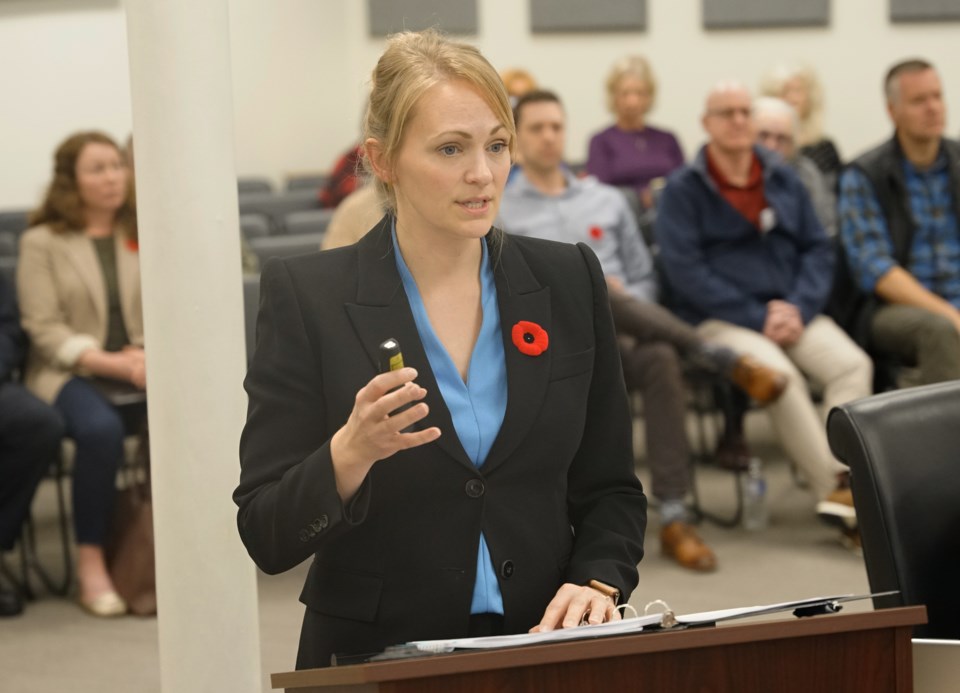Draft one of City of Powell River’s 2024 to 2028 five-year financial plan proposes a nine per cent increase in 2024 in city taxes to maintain current service levels.
At the November 2 city council meeting, chief financial officer Mallory Denniston outlined the draft and the three top drivers for the proposed property tax increases.
Denniston said in 2024, in a breakdown of uses of city funds, capital expenditures amount to 46 per cent of the budget. The remaining is split among the services the city provides. Denniston said the services are funded from a variety of sources. The largest in 2024 will be 29 per cent from transfers from reserves, and is mainly for capital projects, she said. Property and parcel taxes amount to about 28 per cent and government transfers amount to 19 per cent, according to Denniston.
“What we are going to focus on is property tax because in order to balance the budget, which is being prepared under the assumption of maintaining current service levels for draft one, property tax needs to be set in order to balance the budget,” said Denniston. “For this service level, the tax revenue would need to be increased in 2024 by nine per cent. For the remaining years it would decrease eight per cent, seven per cent, six per cent, then five per cent.
“This proposed schedule is not only to balance the budget, but it is also being proposed in this gradual approach to avoid double digit increases, which many municipalities are facing.”
Denniston said the city will be able to transfer some funds to capital reserves, which earn interest, and the city will ultimately need to collect less money for the capital in the next five years.
“These are notable increases and I want to highlight that the City of Powell River is not alone in the need to increase property taxes to maintain service levels,” said Denniston. She made a comparison of Powell River to Comox and Courtenay, where in 2023, Powell River’s tax increase was four per cent, the BC municipal average was nine per cent, Comox was 10 per cent and Courtenay was 11 per cent.
Denniston then outlined the drivers for the increases. She said the first is inflation. There is an increase in debt servicing costs and there are also low reserve funds, paired with high capital costs, she added.
Denniston said there was a 6.9 per cent inflation rate in 2022 and 2023 is tracking around five per cent.
“Those are significant amounts,” said Denniston.
The second driver is an increase in debt servicing costs. Denniston said in 2024 the city will take on an additional $350,000 in debt servicing costs related to the final debt draw for the consolidated wastewater treatment plant.
Denniston said the third reason for the property tax increase in order to balance the budget is low reserves. She said in the 1950s, the city had the world’s largest pulp and paper mill, and the mill contributed a large amount of major industry property taxes, which allowed the city to build wonderful facilities and infrastructure.
“When that industry started to decline in the 1980s, it was very difficult to justify keeping taxes high enough to save for future capital costs that would not occur for another 30 or 40 years,” said Denniston. “We are at a time where infrastructure is coming due for replacement based on its age. We are needing to increase property taxes to pump up our reserves in order to address the immediate capital costs that are ahead of us.”
Denniston outlined the RCMP future cost share increase. According to her report to council, municipalities under a population of 15,000 pay for 70 per cent of policing costs, but those over 15,000 pay 90 per cent. It is anticipated that the city population will exceed 15,000 in 2031, the report stated, resulting in an increase of $800,000 to $1 million.
“If we start contributing now, instead of having a tax increase of another five per cent, we can spread out that increase,” said Denniston.
She then outlined the capital plan, which has $43 million in costs planned for 2024. Of this total, $41 million is carried forward from projects that were not completed in 2023 or were approved to start in 2024, according to Denniston. Only $1.8 million of the total is new requests. Denniston said that 47 per cent of the total is covered through grants from the provincial and federal governments.
At this point in the budgeting process, Denniston said the city is trying to estimate the cost of different service levels. She said that the 2024 property assessments are not yet available so she can’t give a reliable estimate on the cost to property taxpayers.
According to the 2024 five-year financial plan first draft, in 2024, property taxation is expected to bring in $23,182,305, with flat tax property taxation bringing in another $307,683. Total revenue is projected at $60,751,969, with expenses of $47,249,599, leaving a surplus of $13,502,370.
Join the Peak's email list for the top headlines right in your inbox Monday to Friday.



